Health Policy Stakeholders Analysis Report - Health Policy Module
VerifiedAdded on 2022/09/15
|9
|2561
|25
Report
AI Summary
This report analyzes three peer-reviewed articles focusing on health policy stakeholders. The first article examines the acceptability and feasibility of using non-specialist health workers to deliver mental health care in low and middle-income countries, highlighting stakeholder perceptions, challenges like lack of infrastructure and stigma, and implications for policy development. The second article explores the integration of mental health into primary healthcare in Pakistan, identifying challenges such as lack of political commitment and awareness, and potential benefits. The third article investigates stakeholder views on implementing a health care manager program in community mental health clinics, discussing the benefits of the program and the challenges associated with its implementation. The report evaluates stakeholder expectations, challenges, benefits, conflicting interests, and how each article can inform health policy development, emphasizing the importance of local research and contextual factors.
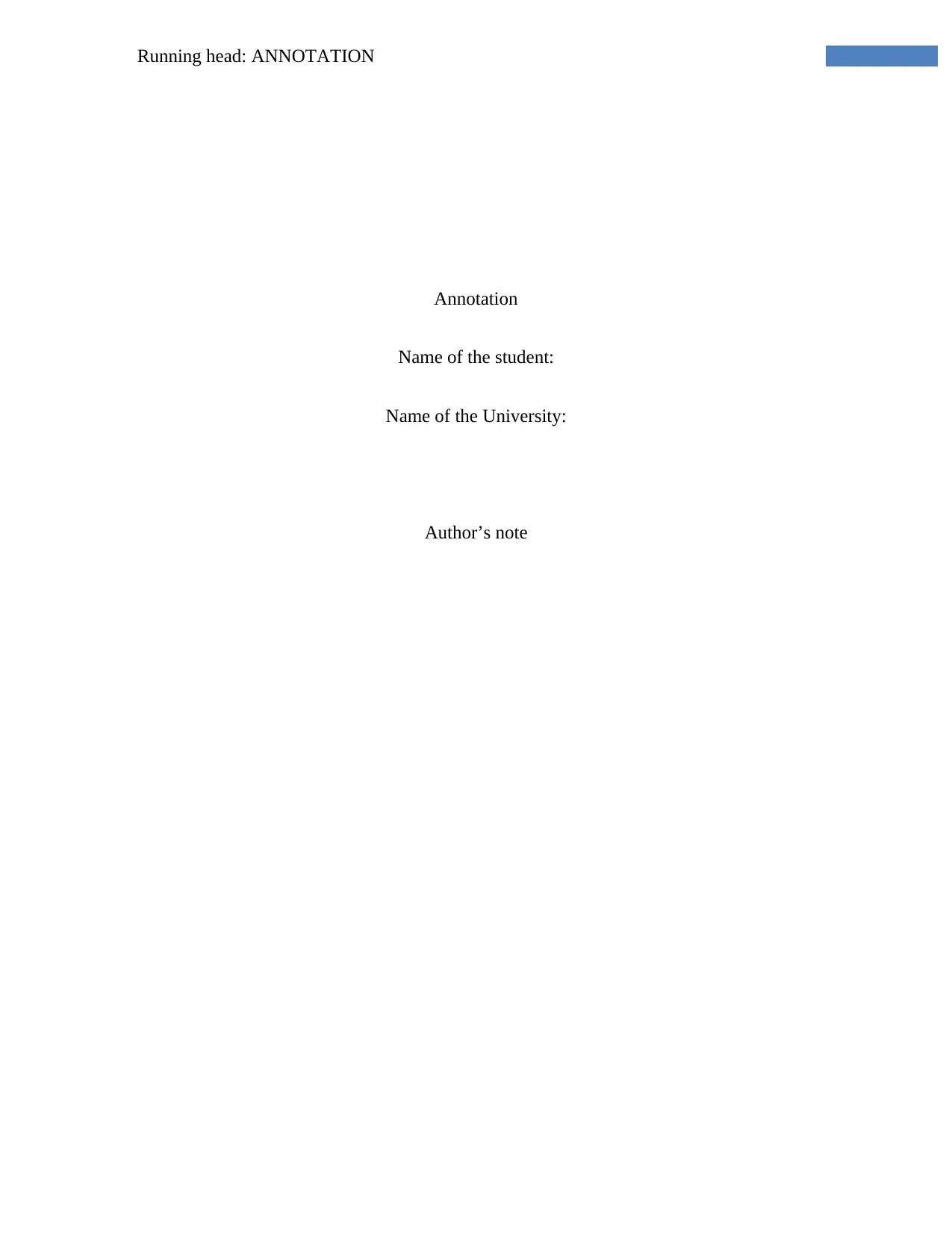
Running head: ANNOTATION
Annotation
Name of the student:
Name of the University:
Author’s note
Annotation
Name of the student:
Name of the University:
Author’s note
Paraphrase This Document
Need a fresh take? Get an instant paraphrase of this document with our AI Paraphraser
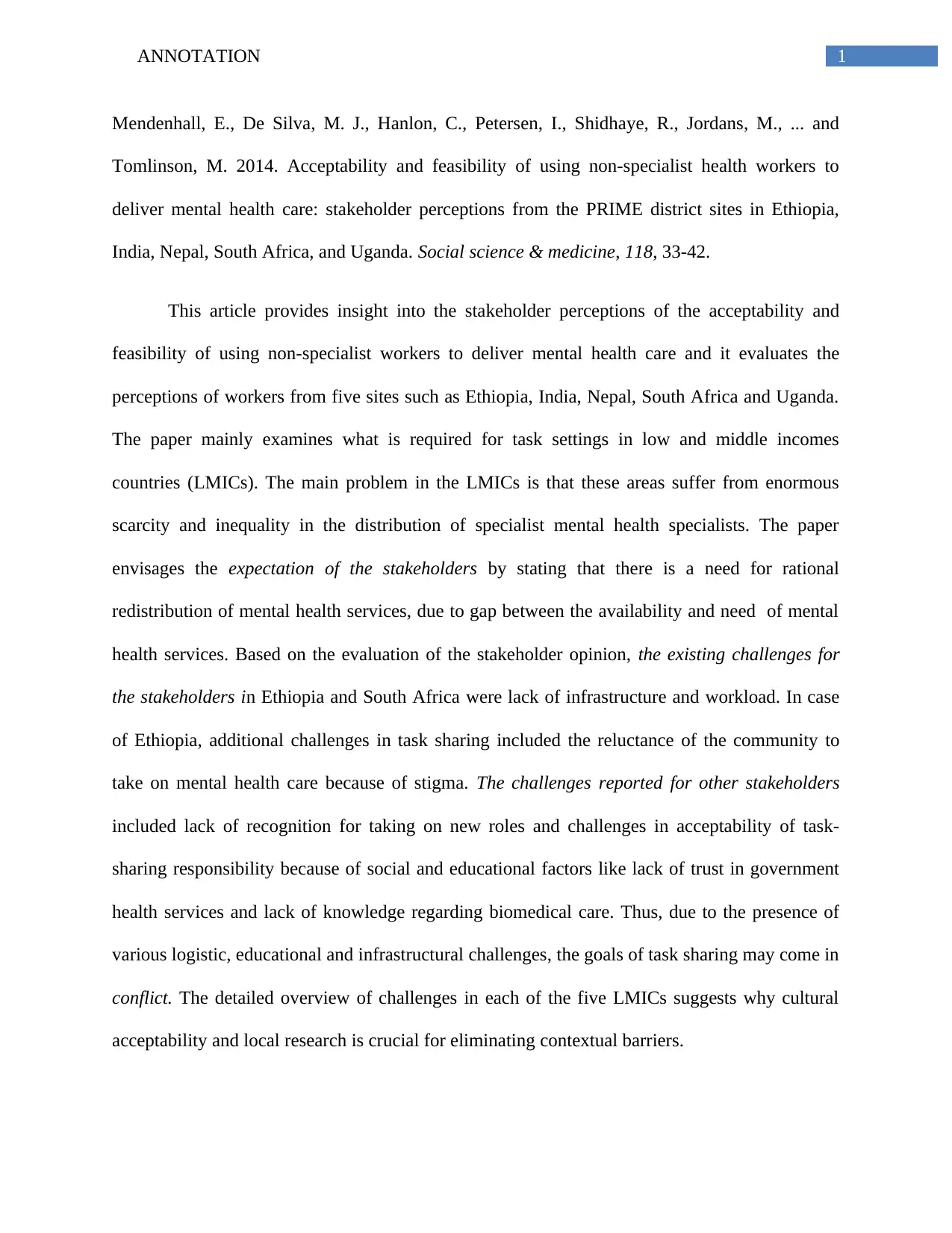
1ANNOTATION
Mendenhall, E., De Silva, M. J., Hanlon, C., Petersen, I., Shidhaye, R., Jordans, M., ... and
Tomlinson, M. 2014. Acceptability and feasibility of using non-specialist health workers to
deliver mental health care: stakeholder perceptions from the PRIME district sites in Ethiopia,
India, Nepal, South Africa, and Uganda. Social science & medicine, 118, 33-42.
This article provides insight into the stakeholder perceptions of the acceptability and
feasibility of using non-specialist workers to deliver mental health care and it evaluates the
perceptions of workers from five sites such as Ethiopia, India, Nepal, South Africa and Uganda.
The paper mainly examines what is required for task settings in low and middle incomes
countries (LMICs). The main problem in the LMICs is that these areas suffer from enormous
scarcity and inequality in the distribution of specialist mental health specialists. The paper
envisages the expectation of the stakeholders by stating that there is a need for rational
redistribution of mental health services, due to gap between the availability and need of mental
health services. Based on the evaluation of the stakeholder opinion, the existing challenges for
the stakeholders in Ethiopia and South Africa were lack of infrastructure and workload. In case
of Ethiopia, additional challenges in task sharing included the reluctance of the community to
take on mental health care because of stigma. The challenges reported for other stakeholders
included lack of recognition for taking on new roles and challenges in acceptability of task-
sharing responsibility because of social and educational factors like lack of trust in government
health services and lack of knowledge regarding biomedical care. Thus, due to the presence of
various logistic, educational and infrastructural challenges, the goals of task sharing may come in
conflict. The detailed overview of challenges in each of the five LMICs suggests why cultural
acceptability and local research is crucial for eliminating contextual barriers.
Mendenhall, E., De Silva, M. J., Hanlon, C., Petersen, I., Shidhaye, R., Jordans, M., ... and
Tomlinson, M. 2014. Acceptability and feasibility of using non-specialist health workers to
deliver mental health care: stakeholder perceptions from the PRIME district sites in Ethiopia,
India, Nepal, South Africa, and Uganda. Social science & medicine, 118, 33-42.
This article provides insight into the stakeholder perceptions of the acceptability and
feasibility of using non-specialist workers to deliver mental health care and it evaluates the
perceptions of workers from five sites such as Ethiopia, India, Nepal, South Africa and Uganda.
The paper mainly examines what is required for task settings in low and middle incomes
countries (LMICs). The main problem in the LMICs is that these areas suffer from enormous
scarcity and inequality in the distribution of specialist mental health specialists. The paper
envisages the expectation of the stakeholders by stating that there is a need for rational
redistribution of mental health services, due to gap between the availability and need of mental
health services. Based on the evaluation of the stakeholder opinion, the existing challenges for
the stakeholders in Ethiopia and South Africa were lack of infrastructure and workload. In case
of Ethiopia, additional challenges in task sharing included the reluctance of the community to
take on mental health care because of stigma. The challenges reported for other stakeholders
included lack of recognition for taking on new roles and challenges in acceptability of task-
sharing responsibility because of social and educational factors like lack of trust in government
health services and lack of knowledge regarding biomedical care. Thus, due to the presence of
various logistic, educational and infrastructural challenges, the goals of task sharing may come in
conflict. The detailed overview of challenges in each of the five LMICs suggests why cultural
acceptability and local research is crucial for eliminating contextual barriers.
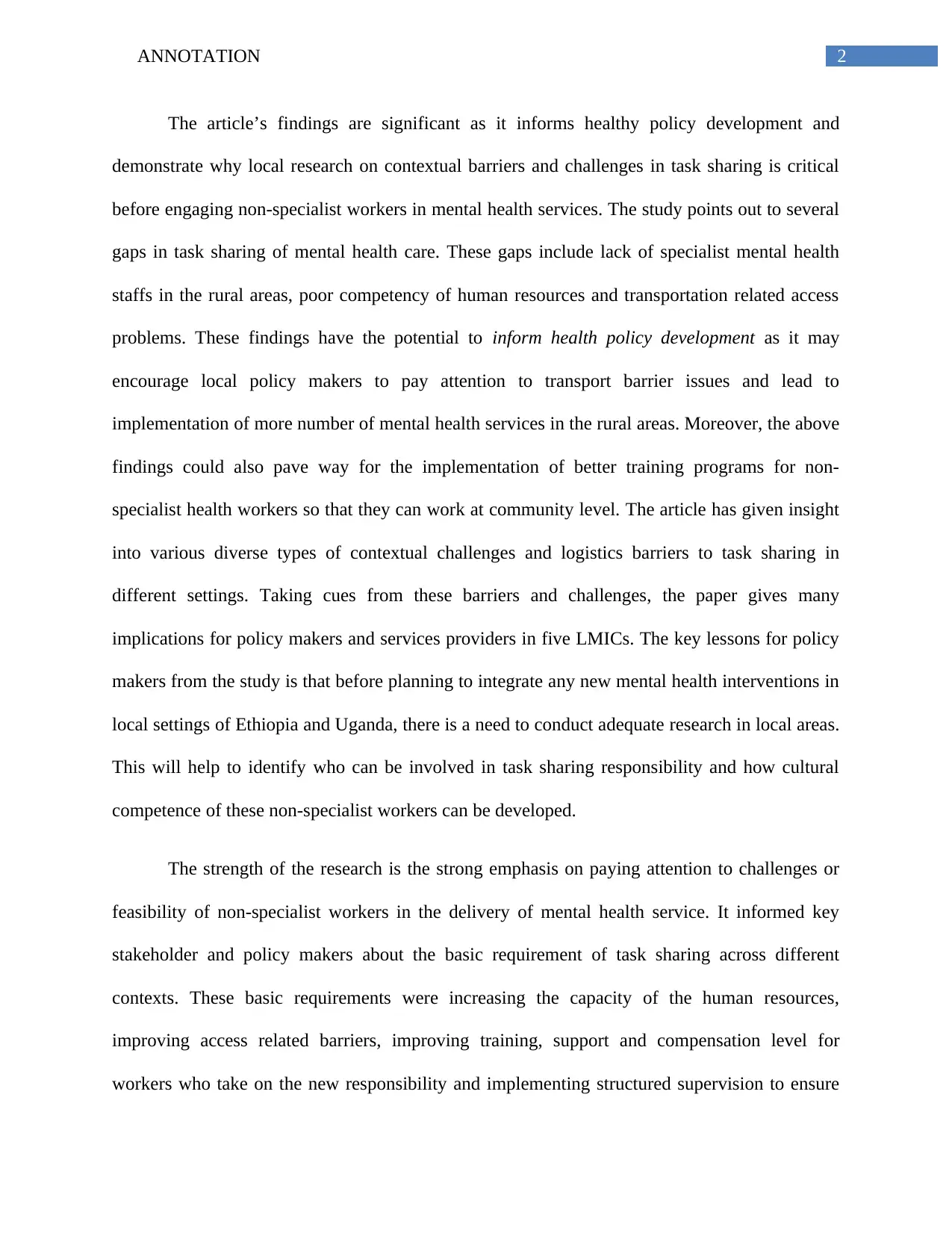
2ANNOTATION
The article’s findings are significant as it informs healthy policy development and
demonstrate why local research on contextual barriers and challenges in task sharing is critical
before engaging non-specialist workers in mental health services. The study points out to several
gaps in task sharing of mental health care. These gaps include lack of specialist mental health
staffs in the rural areas, poor competency of human resources and transportation related access
problems. These findings have the potential to inform health policy development as it may
encourage local policy makers to pay attention to transport barrier issues and lead to
implementation of more number of mental health services in the rural areas. Moreover, the above
findings could also pave way for the implementation of better training programs for non-
specialist health workers so that they can work at community level. The article has given insight
into various diverse types of contextual challenges and logistics barriers to task sharing in
different settings. Taking cues from these barriers and challenges, the paper gives many
implications for policy makers and services providers in five LMICs. The key lessons for policy
makers from the study is that before planning to integrate any new mental health interventions in
local settings of Ethiopia and Uganda, there is a need to conduct adequate research in local areas.
This will help to identify who can be involved in task sharing responsibility and how cultural
competence of these non-specialist workers can be developed.
The strength of the research is the strong emphasis on paying attention to challenges or
feasibility of non-specialist workers in the delivery of mental health service. It informed key
stakeholder and policy makers about the basic requirement of task sharing across different
contexts. These basic requirements were increasing the capacity of the human resources,
improving access related barriers, improving training, support and compensation level for
workers who take on the new responsibility and implementing structured supervision to ensure
The article’s findings are significant as it informs healthy policy development and
demonstrate why local research on contextual barriers and challenges in task sharing is critical
before engaging non-specialist workers in mental health services. The study points out to several
gaps in task sharing of mental health care. These gaps include lack of specialist mental health
staffs in the rural areas, poor competency of human resources and transportation related access
problems. These findings have the potential to inform health policy development as it may
encourage local policy makers to pay attention to transport barrier issues and lead to
implementation of more number of mental health services in the rural areas. Moreover, the above
findings could also pave way for the implementation of better training programs for non-
specialist health workers so that they can work at community level. The article has given insight
into various diverse types of contextual challenges and logistics barriers to task sharing in
different settings. Taking cues from these barriers and challenges, the paper gives many
implications for policy makers and services providers in five LMICs. The key lessons for policy
makers from the study is that before planning to integrate any new mental health interventions in
local settings of Ethiopia and Uganda, there is a need to conduct adequate research in local areas.
This will help to identify who can be involved in task sharing responsibility and how cultural
competence of these non-specialist workers can be developed.
The strength of the research is the strong emphasis on paying attention to challenges or
feasibility of non-specialist workers in the delivery of mental health service. It informed key
stakeholder and policy makers about the basic requirement of task sharing across different
contexts. These basic requirements were increasing the capacity of the human resources,
improving access related barriers, improving training, support and compensation level for
workers who take on the new responsibility and implementing structured supervision to ensure
⊘ This is a preview!⊘
Do you want full access?
Subscribe today to unlock all pages.

Trusted by 1+ million students worldwide
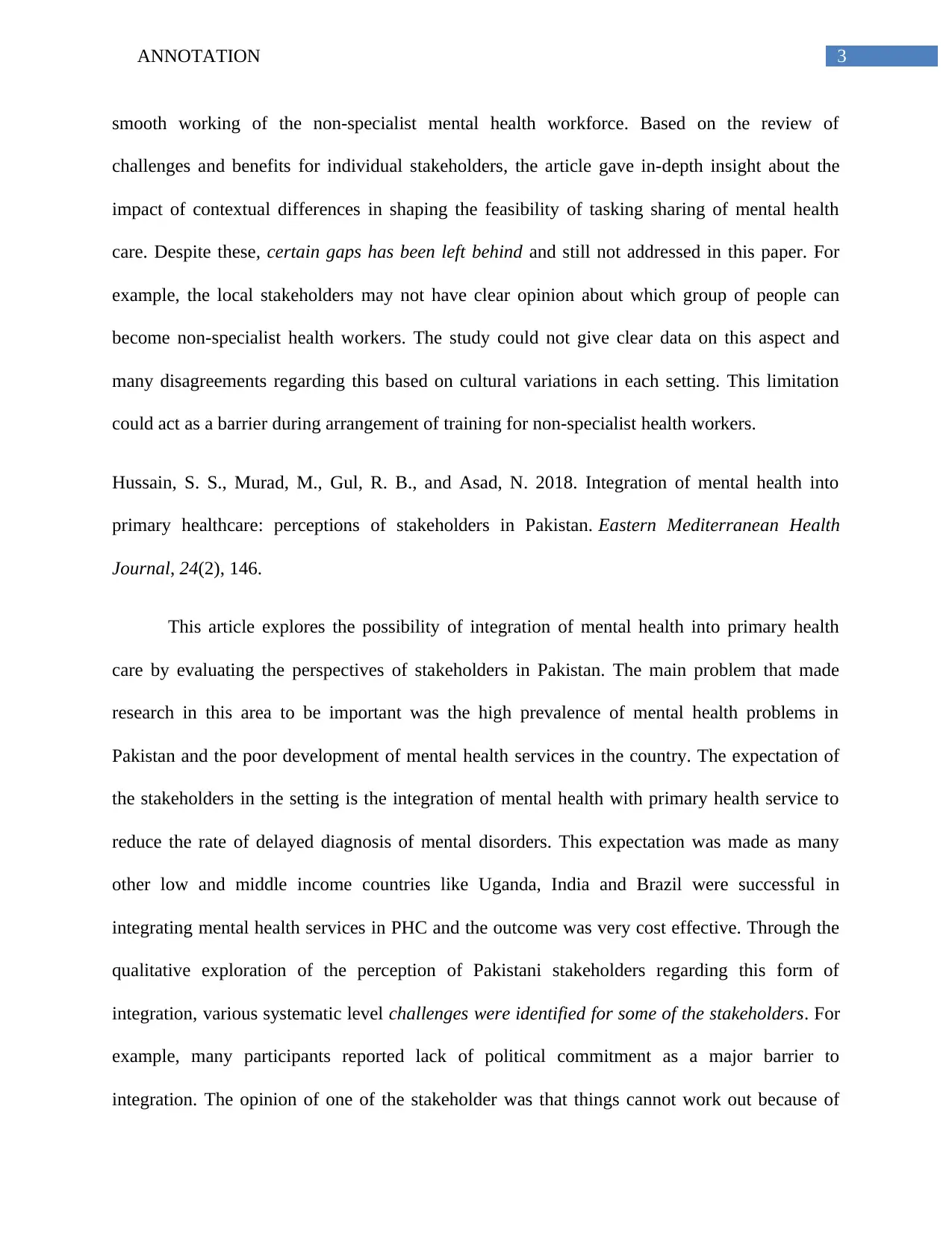
3ANNOTATION
smooth working of the non-specialist mental health workforce. Based on the review of
challenges and benefits for individual stakeholders, the article gave in-depth insight about the
impact of contextual differences in shaping the feasibility of tasking sharing of mental health
care. Despite these, certain gaps has been left behind and still not addressed in this paper. For
example, the local stakeholders may not have clear opinion about which group of people can
become non-specialist health workers. The study could not give clear data on this aspect and
many disagreements regarding this based on cultural variations in each setting. This limitation
could act as a barrier during arrangement of training for non-specialist health workers.
Hussain, S. S., Murad, M., Gul, R. B., and Asad, N. 2018. Integration of mental health into
primary healthcare: perceptions of stakeholders in Pakistan. Eastern Mediterranean Health
Journal, 24(2), 146.
This article explores the possibility of integration of mental health into primary health
care by evaluating the perspectives of stakeholders in Pakistan. The main problem that made
research in this area to be important was the high prevalence of mental health problems in
Pakistan and the poor development of mental health services in the country. The expectation of
the stakeholders in the setting is the integration of mental health with primary health service to
reduce the rate of delayed diagnosis of mental disorders. This expectation was made as many
other low and middle income countries like Uganda, India and Brazil were successful in
integrating mental health services in PHC and the outcome was very cost effective. Through the
qualitative exploration of the perception of Pakistani stakeholders regarding this form of
integration, various systematic level challenges were identified for some of the stakeholders. For
example, many participants reported lack of political commitment as a major barrier to
integration. The opinion of one of the stakeholder was that things cannot work out because of
smooth working of the non-specialist mental health workforce. Based on the review of
challenges and benefits for individual stakeholders, the article gave in-depth insight about the
impact of contextual differences in shaping the feasibility of tasking sharing of mental health
care. Despite these, certain gaps has been left behind and still not addressed in this paper. For
example, the local stakeholders may not have clear opinion about which group of people can
become non-specialist health workers. The study could not give clear data on this aspect and
many disagreements regarding this based on cultural variations in each setting. This limitation
could act as a barrier during arrangement of training for non-specialist health workers.
Hussain, S. S., Murad, M., Gul, R. B., and Asad, N. 2018. Integration of mental health into
primary healthcare: perceptions of stakeholders in Pakistan. Eastern Mediterranean Health
Journal, 24(2), 146.
This article explores the possibility of integration of mental health into primary health
care by evaluating the perspectives of stakeholders in Pakistan. The main problem that made
research in this area to be important was the high prevalence of mental health problems in
Pakistan and the poor development of mental health services in the country. The expectation of
the stakeholders in the setting is the integration of mental health with primary health service to
reduce the rate of delayed diagnosis of mental disorders. This expectation was made as many
other low and middle income countries like Uganda, India and Brazil were successful in
integrating mental health services in PHC and the outcome was very cost effective. Through the
qualitative exploration of the perception of Pakistani stakeholders regarding this form of
integration, various systematic level challenges were identified for some of the stakeholders. For
example, many participants reported lack of political commitment as a major barrier to
integration. The opinion of one of the stakeholder was that things cannot work out because of
Paraphrase This Document
Need a fresh take? Get an instant paraphrase of this document with our AI Paraphraser
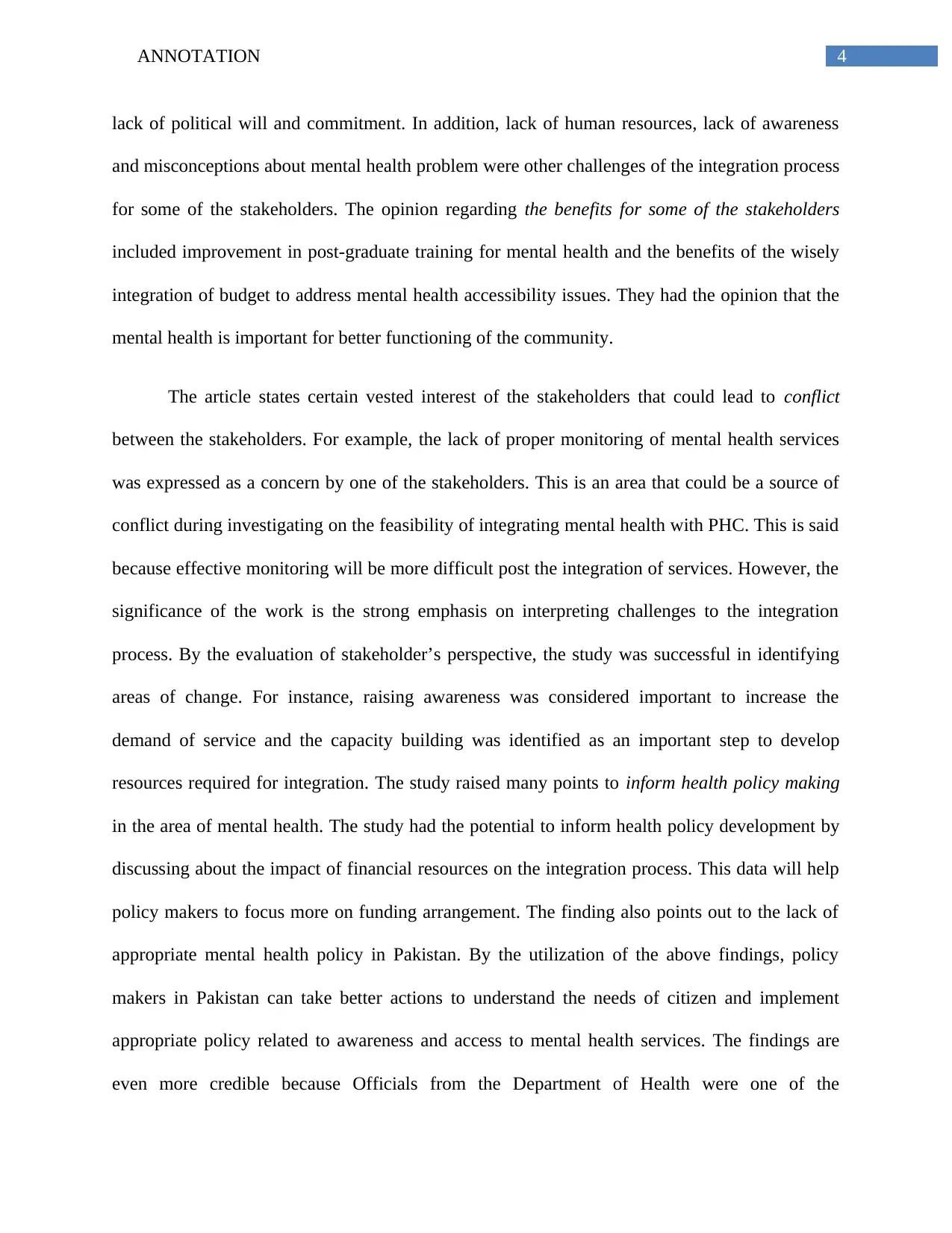
4ANNOTATION
lack of political will and commitment. In addition, lack of human resources, lack of awareness
and misconceptions about mental health problem were other challenges of the integration process
for some of the stakeholders. The opinion regarding the benefits for some of the stakeholders
included improvement in post-graduate training for mental health and the benefits of the wisely
integration of budget to address mental health accessibility issues. They had the opinion that the
mental health is important for better functioning of the community.
The article states certain vested interest of the stakeholders that could lead to conflict
between the stakeholders. For example, the lack of proper monitoring of mental health services
was expressed as a concern by one of the stakeholders. This is an area that could be a source of
conflict during investigating on the feasibility of integrating mental health with PHC. This is said
because effective monitoring will be more difficult post the integration of services. However, the
significance of the work is the strong emphasis on interpreting challenges to the integration
process. By the evaluation of stakeholder’s perspective, the study was successful in identifying
areas of change. For instance, raising awareness was considered important to increase the
demand of service and the capacity building was identified as an important step to develop
resources required for integration. The study raised many points to inform health policy making
in the area of mental health. The study had the potential to inform health policy development by
discussing about the impact of financial resources on the integration process. This data will help
policy makers to focus more on funding arrangement. The finding also points out to the lack of
appropriate mental health policy in Pakistan. By the utilization of the above findings, policy
makers in Pakistan can take better actions to understand the needs of citizen and implement
appropriate policy related to awareness and access to mental health services. The findings are
even more credible because Officials from the Department of Health were one of the
lack of political will and commitment. In addition, lack of human resources, lack of awareness
and misconceptions about mental health problem were other challenges of the integration process
for some of the stakeholders. The opinion regarding the benefits for some of the stakeholders
included improvement in post-graduate training for mental health and the benefits of the wisely
integration of budget to address mental health accessibility issues. They had the opinion that the
mental health is important for better functioning of the community.
The article states certain vested interest of the stakeholders that could lead to conflict
between the stakeholders. For example, the lack of proper monitoring of mental health services
was expressed as a concern by one of the stakeholders. This is an area that could be a source of
conflict during investigating on the feasibility of integrating mental health with PHC. This is said
because effective monitoring will be more difficult post the integration of services. However, the
significance of the work is the strong emphasis on interpreting challenges to the integration
process. By the evaluation of stakeholder’s perspective, the study was successful in identifying
areas of change. For instance, raising awareness was considered important to increase the
demand of service and the capacity building was identified as an important step to develop
resources required for integration. The study raised many points to inform health policy making
in the area of mental health. The study had the potential to inform health policy development by
discussing about the impact of financial resources on the integration process. This data will help
policy makers to focus more on funding arrangement. The finding also points out to the lack of
appropriate mental health policy in Pakistan. By the utilization of the above findings, policy
makers in Pakistan can take better actions to understand the needs of citizen and implement
appropriate policy related to awareness and access to mental health services. The findings are
even more credible because Officials from the Department of Health were one of the
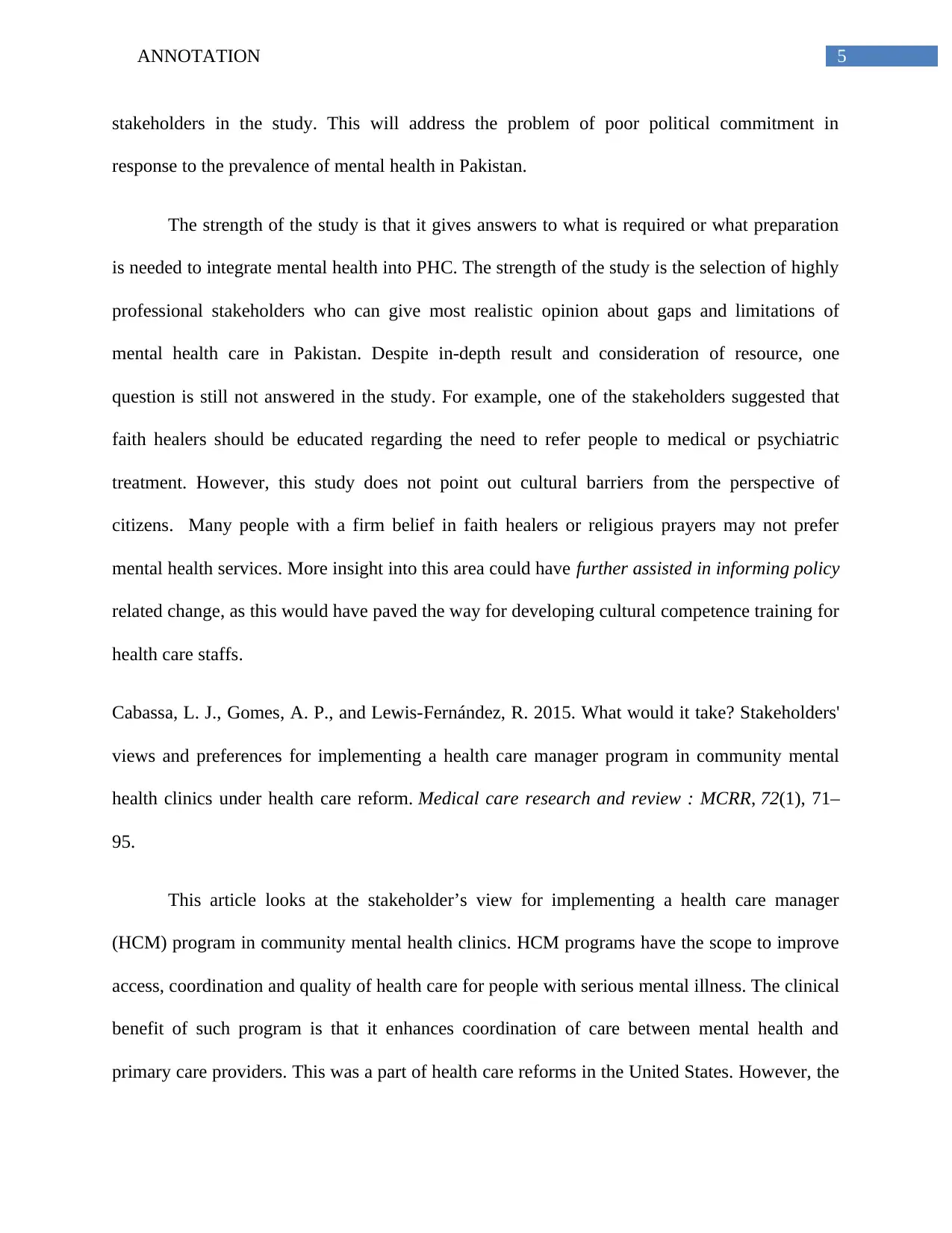
5ANNOTATION
stakeholders in the study. This will address the problem of poor political commitment in
response to the prevalence of mental health in Pakistan.
The strength of the study is that it gives answers to what is required or what preparation
is needed to integrate mental health into PHC. The strength of the study is the selection of highly
professional stakeholders who can give most realistic opinion about gaps and limitations of
mental health care in Pakistan. Despite in-depth result and consideration of resource, one
question is still not answered in the study. For example, one of the stakeholders suggested that
faith healers should be educated regarding the need to refer people to medical or psychiatric
treatment. However, this study does not point out cultural barriers from the perspective of
citizens. Many people with a firm belief in faith healers or religious prayers may not prefer
mental health services. More insight into this area could have further assisted in informing policy
related change, as this would have paved the way for developing cultural competence training for
health care staffs.
Cabassa, L. J., Gomes, A. P., and Lewis-Fernández, R. 2015. What would it take? Stakeholders'
views and preferences for implementing a health care manager program in community mental
health clinics under health care reform. Medical care research and review : MCRR, 72(1), 71–
95.
This article looks at the stakeholder’s view for implementing a health care manager
(HCM) program in community mental health clinics. HCM programs have the scope to improve
access, coordination and quality of health care for people with serious mental illness. The clinical
benefit of such program is that it enhances coordination of care between mental health and
primary care providers. This was a part of health care reforms in the United States. However, the
stakeholders in the study. This will address the problem of poor political commitment in
response to the prevalence of mental health in Pakistan.
The strength of the study is that it gives answers to what is required or what preparation
is needed to integrate mental health into PHC. The strength of the study is the selection of highly
professional stakeholders who can give most realistic opinion about gaps and limitations of
mental health care in Pakistan. Despite in-depth result and consideration of resource, one
question is still not answered in the study. For example, one of the stakeholders suggested that
faith healers should be educated regarding the need to refer people to medical or psychiatric
treatment. However, this study does not point out cultural barriers from the perspective of
citizens. Many people with a firm belief in faith healers or religious prayers may not prefer
mental health services. More insight into this area could have further assisted in informing policy
related change, as this would have paved the way for developing cultural competence training for
health care staffs.
Cabassa, L. J., Gomes, A. P., and Lewis-Fernández, R. 2015. What would it take? Stakeholders'
views and preferences for implementing a health care manager program in community mental
health clinics under health care reform. Medical care research and review : MCRR, 72(1), 71–
95.
This article looks at the stakeholder’s view for implementing a health care manager
(HCM) program in community mental health clinics. HCM programs have the scope to improve
access, coordination and quality of health care for people with serious mental illness. The clinical
benefit of such program is that it enhances coordination of care between mental health and
primary care providers. This was a part of health care reforms in the United States. However, the
⊘ This is a preview!⊘
Do you want full access?
Subscribe today to unlock all pages.

Trusted by 1+ million students worldwide
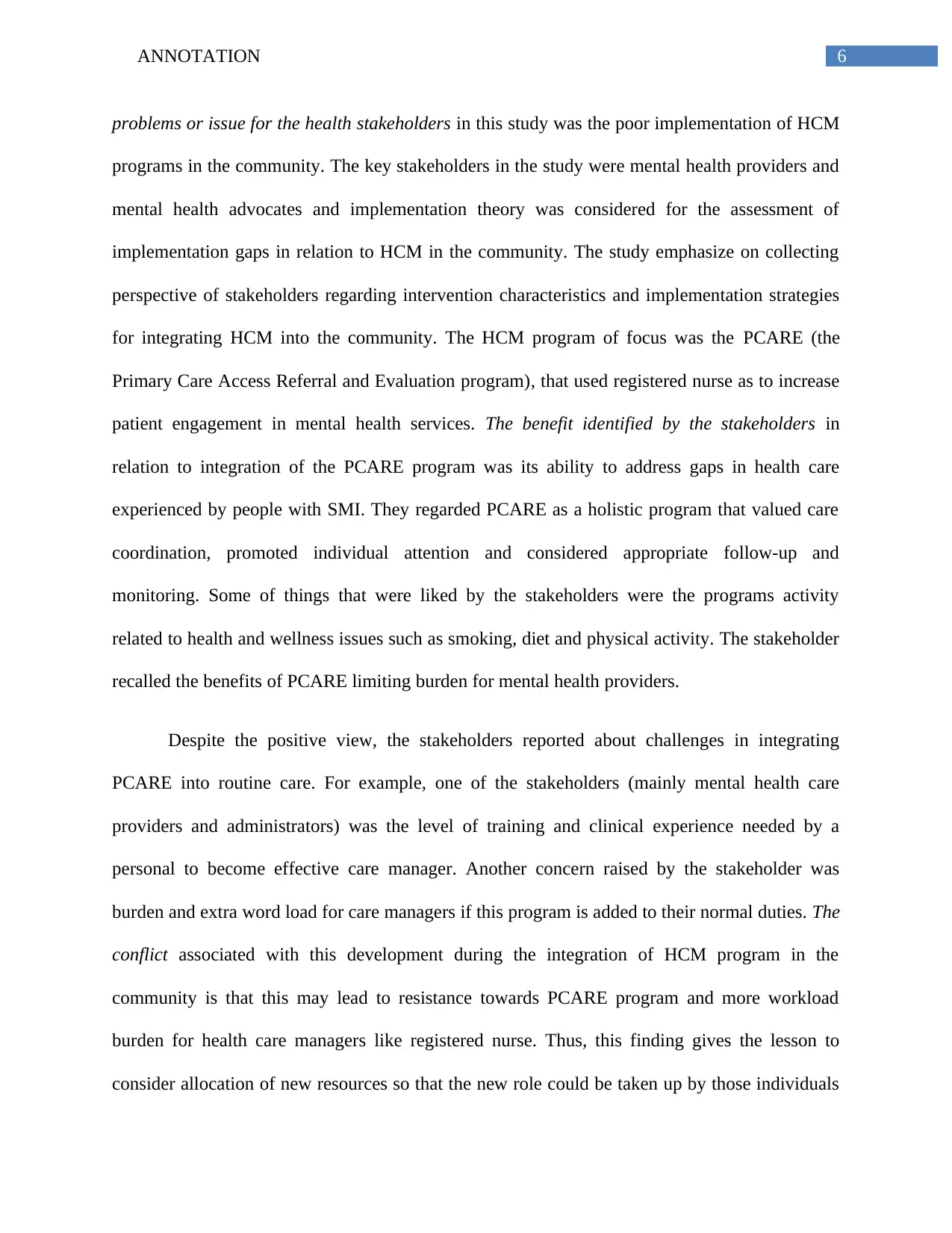
6ANNOTATION
problems or issue for the health stakeholders in this study was the poor implementation of HCM
programs in the community. The key stakeholders in the study were mental health providers and
mental health advocates and implementation theory was considered for the assessment of
implementation gaps in relation to HCM in the community. The study emphasize on collecting
perspective of stakeholders regarding intervention characteristics and implementation strategies
for integrating HCM into the community. The HCM program of focus was the PCARE (the
Primary Care Access Referral and Evaluation program), that used registered nurse as to increase
patient engagement in mental health services. The benefit identified by the stakeholders in
relation to integration of the PCARE program was its ability to address gaps in health care
experienced by people with SMI. They regarded PCARE as a holistic program that valued care
coordination, promoted individual attention and considered appropriate follow-up and
monitoring. Some of things that were liked by the stakeholders were the programs activity
related to health and wellness issues such as smoking, diet and physical activity. The stakeholder
recalled the benefits of PCARE limiting burden for mental health providers.
Despite the positive view, the stakeholders reported about challenges in integrating
PCARE into routine care. For example, one of the stakeholders (mainly mental health care
providers and administrators) was the level of training and clinical experience needed by a
personal to become effective care manager. Another concern raised by the stakeholder was
burden and extra word load for care managers if this program is added to their normal duties. The
conflict associated with this development during the integration of HCM program in the
community is that this may lead to resistance towards PCARE program and more workload
burden for health care managers like registered nurse. Thus, this finding gives the lesson to
consider allocation of new resources so that the new role could be taken up by those individuals
problems or issue for the health stakeholders in this study was the poor implementation of HCM
programs in the community. The key stakeholders in the study were mental health providers and
mental health advocates and implementation theory was considered for the assessment of
implementation gaps in relation to HCM in the community. The study emphasize on collecting
perspective of stakeholders regarding intervention characteristics and implementation strategies
for integrating HCM into the community. The HCM program of focus was the PCARE (the
Primary Care Access Referral and Evaluation program), that used registered nurse as to increase
patient engagement in mental health services. The benefit identified by the stakeholders in
relation to integration of the PCARE program was its ability to address gaps in health care
experienced by people with SMI. They regarded PCARE as a holistic program that valued care
coordination, promoted individual attention and considered appropriate follow-up and
monitoring. Some of things that were liked by the stakeholders were the programs activity
related to health and wellness issues such as smoking, diet and physical activity. The stakeholder
recalled the benefits of PCARE limiting burden for mental health providers.
Despite the positive view, the stakeholders reported about challenges in integrating
PCARE into routine care. For example, one of the stakeholders (mainly mental health care
providers and administrators) was the level of training and clinical experience needed by a
personal to become effective care manager. Another concern raised by the stakeholder was
burden and extra word load for care managers if this program is added to their normal duties. The
conflict associated with this development during the integration of HCM program in the
community is that this may lead to resistance towards PCARE program and more workload
burden for health care managers like registered nurse. Thus, this finding gives the lesson to
consider allocation of new resources so that the new role could be taken up by those individuals
Paraphrase This Document
Need a fresh take? Get an instant paraphrase of this document with our AI Paraphraser
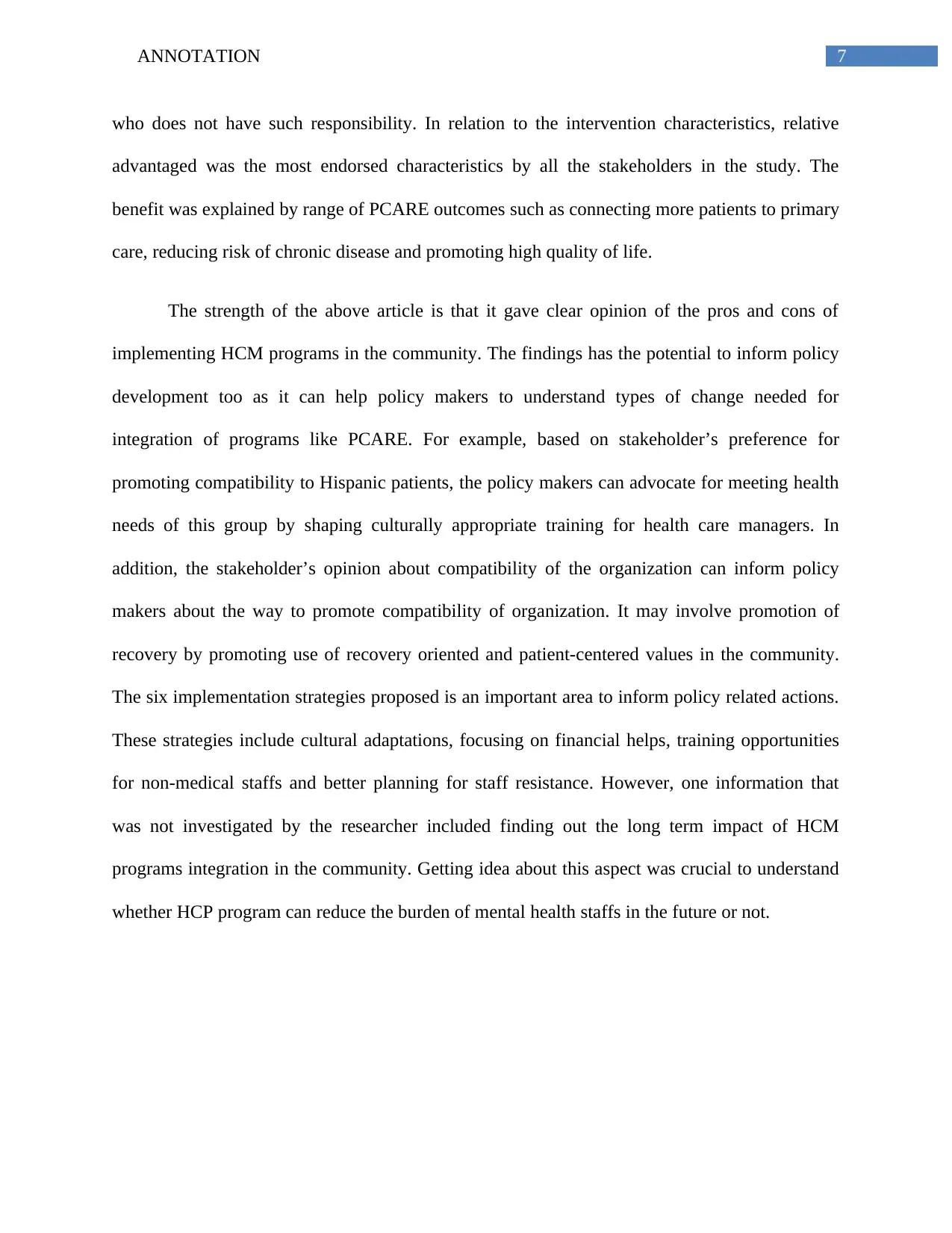
7ANNOTATION
who does not have such responsibility. In relation to the intervention characteristics, relative
advantaged was the most endorsed characteristics by all the stakeholders in the study. The
benefit was explained by range of PCARE outcomes such as connecting more patients to primary
care, reducing risk of chronic disease and promoting high quality of life.
The strength of the above article is that it gave clear opinion of the pros and cons of
implementing HCM programs in the community. The findings has the potential to inform policy
development too as it can help policy makers to understand types of change needed for
integration of programs like PCARE. For example, based on stakeholder’s preference for
promoting compatibility to Hispanic patients, the policy makers can advocate for meeting health
needs of this group by shaping culturally appropriate training for health care managers. In
addition, the stakeholder’s opinion about compatibility of the organization can inform policy
makers about the way to promote compatibility of organization. It may involve promotion of
recovery by promoting use of recovery oriented and patient-centered values in the community.
The six implementation strategies proposed is an important area to inform policy related actions.
These strategies include cultural adaptations, focusing on financial helps, training opportunities
for non-medical staffs and better planning for staff resistance. However, one information that
was not investigated by the researcher included finding out the long term impact of HCM
programs integration in the community. Getting idea about this aspect was crucial to understand
whether HCP program can reduce the burden of mental health staffs in the future or not.
who does not have such responsibility. In relation to the intervention characteristics, relative
advantaged was the most endorsed characteristics by all the stakeholders in the study. The
benefit was explained by range of PCARE outcomes such as connecting more patients to primary
care, reducing risk of chronic disease and promoting high quality of life.
The strength of the above article is that it gave clear opinion of the pros and cons of
implementing HCM programs in the community. The findings has the potential to inform policy
development too as it can help policy makers to understand types of change needed for
integration of programs like PCARE. For example, based on stakeholder’s preference for
promoting compatibility to Hispanic patients, the policy makers can advocate for meeting health
needs of this group by shaping culturally appropriate training for health care managers. In
addition, the stakeholder’s opinion about compatibility of the organization can inform policy
makers about the way to promote compatibility of organization. It may involve promotion of
recovery by promoting use of recovery oriented and patient-centered values in the community.
The six implementation strategies proposed is an important area to inform policy related actions.
These strategies include cultural adaptations, focusing on financial helps, training opportunities
for non-medical staffs and better planning for staff resistance. However, one information that
was not investigated by the researcher included finding out the long term impact of HCM
programs integration in the community. Getting idea about this aspect was crucial to understand
whether HCP program can reduce the burden of mental health staffs in the future or not.
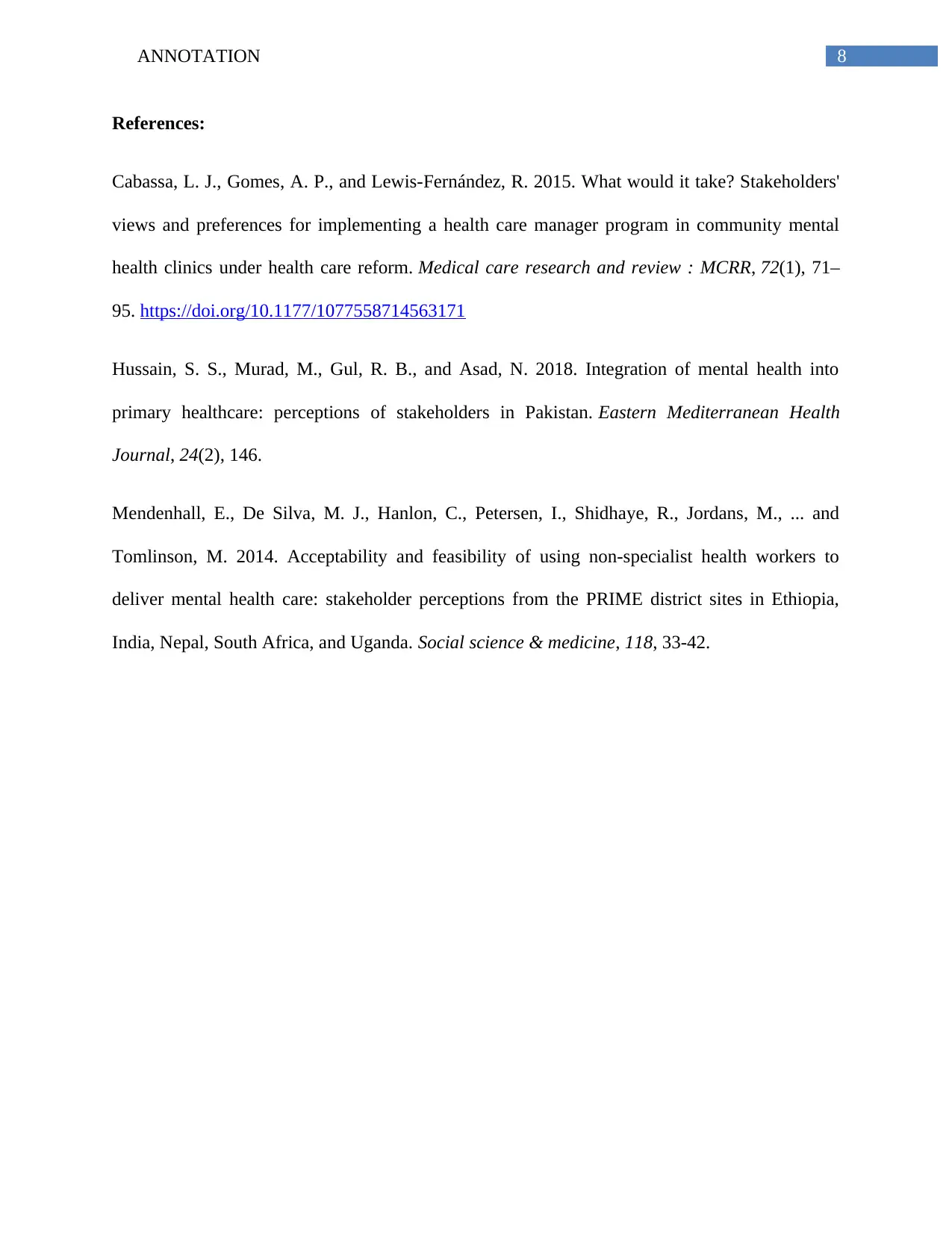
8ANNOTATION
References:
Cabassa, L. J., Gomes, A. P., and Lewis-Fernández, R. 2015. What would it take? Stakeholders'
views and preferences for implementing a health care manager program in community mental
health clinics under health care reform. Medical care research and review : MCRR, 72(1), 71–
95. https://doi.org/10.1177/1077558714563171
Hussain, S. S., Murad, M., Gul, R. B., and Asad, N. 2018. Integration of mental health into
primary healthcare: perceptions of stakeholders in Pakistan. Eastern Mediterranean Health
Journal, 24(2), 146.
Mendenhall, E., De Silva, M. J., Hanlon, C., Petersen, I., Shidhaye, R., Jordans, M., ... and
Tomlinson, M. 2014. Acceptability and feasibility of using non-specialist health workers to
deliver mental health care: stakeholder perceptions from the PRIME district sites in Ethiopia,
India, Nepal, South Africa, and Uganda. Social science & medicine, 118, 33-42.
References:
Cabassa, L. J., Gomes, A. P., and Lewis-Fernández, R. 2015. What would it take? Stakeholders'
views and preferences for implementing a health care manager program in community mental
health clinics under health care reform. Medical care research and review : MCRR, 72(1), 71–
95. https://doi.org/10.1177/1077558714563171
Hussain, S. S., Murad, M., Gul, R. B., and Asad, N. 2018. Integration of mental health into
primary healthcare: perceptions of stakeholders in Pakistan. Eastern Mediterranean Health
Journal, 24(2), 146.
Mendenhall, E., De Silva, M. J., Hanlon, C., Petersen, I., Shidhaye, R., Jordans, M., ... and
Tomlinson, M. 2014. Acceptability and feasibility of using non-specialist health workers to
deliver mental health care: stakeholder perceptions from the PRIME district sites in Ethiopia,
India, Nepal, South Africa, and Uganda. Social science & medicine, 118, 33-42.
⊘ This is a preview!⊘
Do you want full access?
Subscribe today to unlock all pages.

Trusted by 1+ million students worldwide
1 out of 9
Your All-in-One AI-Powered Toolkit for Academic Success.
+13062052269
info@desklib.com
Available 24*7 on WhatsApp / Email
![[object Object]](/_next/static/media/star-bottom.7253800d.svg)
Unlock your academic potential
Copyright © 2020–2026 A2Z Services. All Rights Reserved. Developed and managed by ZUCOL.
